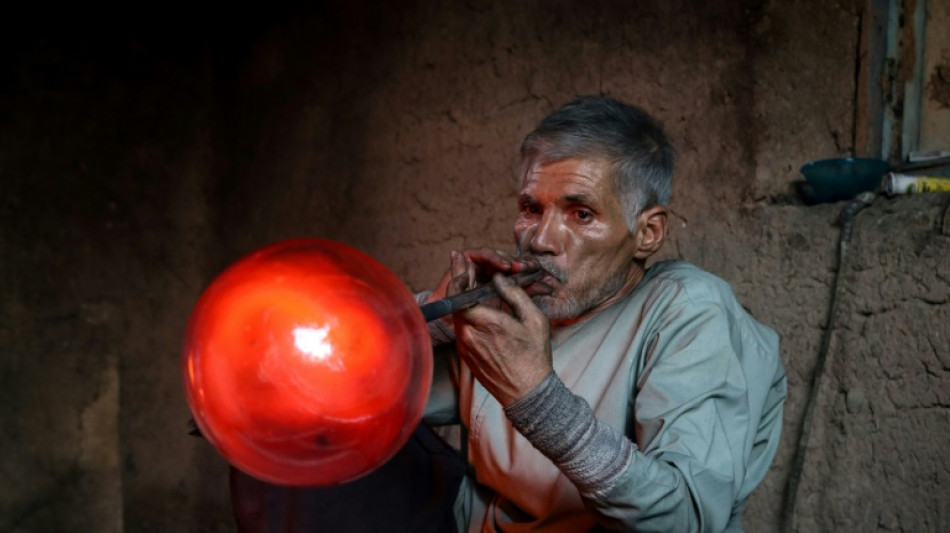
-
 Naib's fifty lifts Afghanistan to 182-6 against New Zealand
Naib's fifty lifts Afghanistan to 182-6 against New Zealand
-
Paul Thomas Anderson wins top director prize for 'One Battle After Another'

-
 De Beers sale drags in diamond doldrums
De Beers sale drags in diamond doldrums
-
NFL embraces fashion as league seeks new audiences

-
 What's at stake for Indian agriculture in Trump's trade deal?
What's at stake for Indian agriculture in Trump's trade deal?
-
Real Madrid can wait - Siraj's dream night after late T20 call-up

-
 Castle's monster night fuels Spurs, Rockets rally to beat Thunder
Castle's monster night fuels Spurs, Rockets rally to beat Thunder
-
Japan votes in snow-hit snap polls as Takaichi eyes strong mandate

-
 Pakistan's capital picks concrete over trees, angering residents
Pakistan's capital picks concrete over trees, angering residents
-
Berlin's crumbling 'Russian houses' trapped in bureaucratic limbo

-
 Neglected killer: kala-azar disease surges in Kenya
Neglected killer: kala-azar disease surges in Kenya
-
Super Bowl set for Patriots-Seahawks showdown as politics swirl

-
 Sengun shines as Rockets rally to beat NBA champion Thunder
Sengun shines as Rockets rally to beat NBA champion Thunder
-
Matsuyama grabs PGA Phoenix Open lead with Hisatsune one back

-
 Washington Post CEO out after sweeping job cuts
Washington Post CEO out after sweeping job cuts
-
Haiti's transitional council hands power to PM

-
 N. Korea to hold party congress in February, first since 2021
N. Korea to hold party congress in February, first since 2021
-
Thailand votes after three leaders in two years

-
 Swiss joy as Von Allmen wins first gold of Winter Olympics
Swiss joy as Von Allmen wins first gold of Winter Olympics
-
George backs England to 'kick on' after Six Nations rout of Wales

-
 Malinin upstaged as Japan keep pressure on USA in skating team event
Malinin upstaged as Japan keep pressure on USA in skating team event
-
Japan's Kimura soars to Olympic gold in snowboard big air final

-
 Vail's golden comets Vonn and Shiffrin inspire those who follow
Vail's golden comets Vonn and Shiffrin inspire those who follow
-
Veteran French politician loses culture post over Epstein links

-
 Japan's Kimura wins Olympic snowboard big air gold
Japan's Kimura wins Olympic snowboard big air gold
-
Arteta backs confident Gyokeres to hit 'highest level'

-
 Hojlund the hero as Napoli snatch late win at Genoa
Hojlund the hero as Napoli snatch late win at Genoa
-
England's Arundell 'frustrated' despite hat-trick in Wales romp

-
 Lollobrigida skates to first Italian gold of Winter Olympics on her birthday
Lollobrigida skates to first Italian gold of Winter Olympics on her birthday
-
Arundell hat-trick inspires England thrashing of Wales in Six Nations opener

-
 Chile's climate summit chief to lead plastic pollution treaty talks
Chile's climate summit chief to lead plastic pollution treaty talks
-
Rosenior hails 'unstoppable' Palmer after treble tames Wolves

-
 French ex-minister offers resignation from Paris cultural hub over Epstein links
French ex-minister offers resignation from Paris cultural hub over Epstein links
-
New NBA dunk contest champ assured and shooting stars return

-
 Shiffrin says will use lessons learnt from Beijing flop at 2026 Games
Shiffrin says will use lessons learnt from Beijing flop at 2026 Games
-
Takaichi tipped for big win as Japan votes

-
 Lens return top of Ligue 1 with win over Rennes
Lens return top of Ligue 1 with win over Rennes
-
Shiffrin learning from Beijing lessons ahead of Milan-Cortina bow

-
 Demonstrators in Berlin call for fall of Iran's Islamic republic
Demonstrators in Berlin call for fall of Iran's Islamic republic
-
'Free the mountains!": clashes at Milan protest over Winter Olympics

-
 Townsend accepts pressure will mount on him after Italy defeat
Townsend accepts pressure will mount on him after Italy defeat
-
BMW iX3 new style and design

-
 Suryakumar's 84 leads India to opening win over USA in T20 World Cup
Suryakumar's 84 leads India to opening win over USA in T20 World Cup
-
Lollobrigida skates to first Italian gold of Milan-Cortina Games

-
 Barca beat Mallorca to extend Liga lead
Barca beat Mallorca to extend Liga lead
-
Gyokeres lifts Arsenal nine clear as Man Utd pile pressure on Frank

-
 Late Guirassy winner for Dortmund trims Bayern's lead atop Bundesliga
Late Guirassy winner for Dortmund trims Bayern's lead atop Bundesliga
-
'Free the mountains!": protest in Milan over Winter Olympics

-
 Gyokeres double helps Arsenal stretch Premier League lead
Gyokeres double helps Arsenal stretch Premier League lead
-
New Skoda Epiq: modern with range


Fragile but unbroken, Afghan glassblowers refuse to quit
Seated in front of a searing furnace, Ghulam Sakhi Saifi teases forth sinews of molten blue glass -- the guardian of an Afghan glassblowing trade refusing to break with tradition.
"This is our art, our inheritance. It has fed us for a long time," he told AFP, resting from the work that has singed his knuckles and calloused his palms.
"We are trying to make sure it is not forgotten. If we do not pass it down, it will disappear from the whole world," said Saifi, who guesses his age is around 50.
Glassblowing in Afghanistan's western city of Herat is an ancient craft. Saifi says it has run in his family for about three centuries.
The last two furnaces in the windswept metropolis near the border with Iran are in his family home and a mud-and-straw shed with a holey roof in the shadow of Herat's citadel.
- 'Slow suffocation' -
Saifi now lights one of the furnaces only once a month -- eking out around $30 from his stock of cups, plates and candleholders after expensive wood for fuel, dyes and other raw materials are accounted for.
He attributes the dramatic downturn to the exodus of already low numbers of foreign customers during the Covid-19 pandemic followed by the 2021 Taliban takeover, which saw many diplomats and aid workers pack up and leave.
Cheaper Chinese-made imports have also dented demand.
"There have been times when we haven't worked for three months -- we sit at home forever," he said.
"Locals have no use for these products, for the price they would first think to buy two loaves of bread for their children."
But when the furnace is lit, Saifi is in his element.
With a crude kitchen knife and a blowpipe he pulls glowing globs of glass out of the mud furnace and inflates them into household wares.
Unlike in the past, when they used quartz, the glassblowers now use easier-to-findrecycled bottles shattered into shards and superheated back into their liquid state.
The green and blue pieces cool into charmingly imperfect shapes, shot through with air bubbles, and are sold from clattering piles in shops in Herat and the capital Kabul for around $3 each.
Outside the shed it is already 36 degrees Celsius (97 degrees Fahrenheit) but stepping over the threshold is like being gripped by a sudden fever.
"Sometimes we really feel the heat, I think I am being slowly suffocated," Saifi said. "But this is our inheritance, we are used to it.
"Today is a bad day, but maybe it will get better in the future. Maybe the day after tomorrow, we hope to God."
- 'Craft needs to endure' -
A gaggle of boys and teenagers assists Saifi in his work, but it is growing hard to tempt the younger generation into a trade they view as a dead end.
His eldest son became an expert in the craft only to abandon it for migrant labour over the border in Iran.
Two cousins who learned to blow glass also saw no future and downed their tools.
His middle son, 18-year-old Naqibullah, vows he will continue the trade, though it's not clear how.
Before the Taliban takeover there was still enough demand for three days of work a week -- a distant prospect for the young man who shares shifts with his father on the rare occasion they light the furnaces.
"We hope that there is a future and that day by day things will get better," Naqibullah said.
"Even if we're not making much money the craft needs to endure," he added. "The art of making things by hand needs to be preserved. We can't let this skill disappear."
R.Shaban--SF-PST
